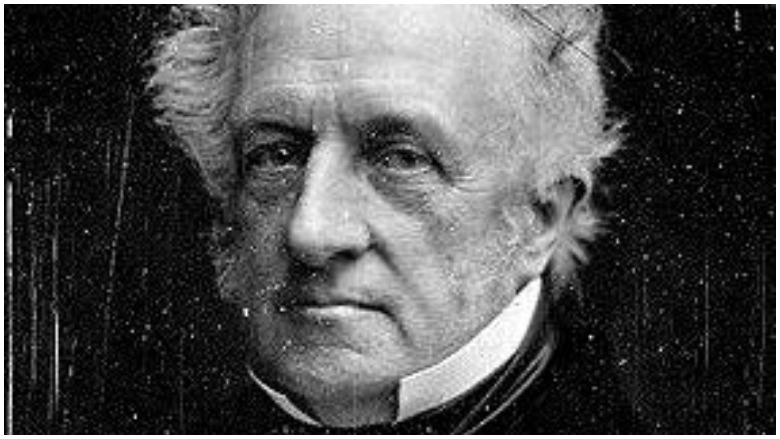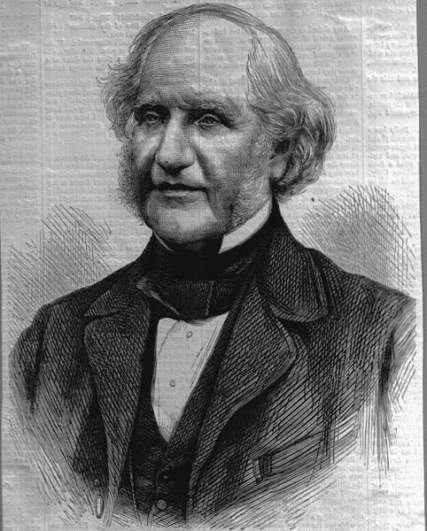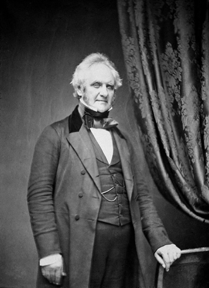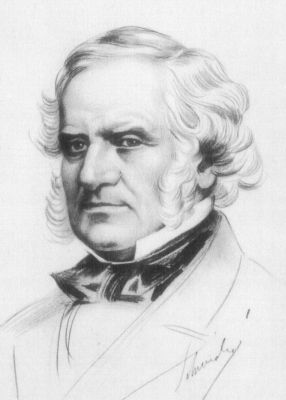
Wikimedia Commons George Peabody
George Peabody, the great philanthropist, was honored with a Google Doodle on March 16, 2018 for his lifetime of giving that helped educational causes, built museums, and helped the poor on both sides of the Atlantic.
Peabody is known as “the father of modern philanthropy,” Google noted. Peabody earned that moniker because the banker and merchant, who was born in the late 1700s, “was almost certainly the first American who was known first and foremost for his charitable giving,” according to Philanthropy Roundtable.
Museums and libraries flourished as a result of Peabody’s charity. Today his name appears on a Massachusetts city and museums at prominent universities. He once said he preferred “practical philanthropy as an investment for the sake of happiness.”
Here’s what you need to know:
1. George Peabody Was Born Poor But Opened a General Store

George Peabody Google Doodle
Peabody was not born into means. In fact, his life was the quintessential “rags-to-riches” story, and he rose to enormous success during his time period without the benefit of much formal education. “Born in 1795 to a poor family in Massachusetts, Peabody had only a few years’ worth of education before opening a local general store,” Google wrote with the Google Doodle.
“His experience in the dry goods business expanded and led to international trade in London, where he would eventually work as a banker and settle in 1837. In that role, Peabody accumulated great wealth and his involvement in both the American and English business and social scenes provided him widespread recognition.”
Peabody later founded an important bank. “Peabody was a merchant banker—indeed, he created one of the most important American banks of the 19th century. Headquartered in London, he helped channel desperately needed European and British capital into promising ventures in the United States,” Philanthropy Roundtable reports.
2. Peabody Devoted His Life & Fortune to Educational Initiatives

George Peabody
Peabody accumulated quite a fortune for his day, and he was interested in furthering educational causes, despite his own lack of schooling. According to Harvard University, he “endowed twenty-two educational institutions during his lifetime.”
“During his life, Peabody immersed himself in public causes, with a particular focus on educational initiatives,” wrote Google. “In fact, it was on this day in 1867 that he was awarded the Congressional Gold Medal after donating $2,000,000 (upwards of $30,000,000 today!) for the advancement of education, an act of generosity made all the more impressive by the fact that he left school at the age of 11.”
According to Brittanica, many charitable endeavors bore his mark. “His Baltimore institute provided a library, art gallery, and music academy. He also funded a historical museum and library in Peabody, Mass., a natural-history museum at Yale University, and a museum of archaeology at Harvard University; and he contributed to many other colleges and historical societies,” the site reports, noting that he tried to help children of all races.
3. Peabody Gave Away Half His Fortune & Was an Abolitionist
How generous was Peabody? “It’s believed that Peabody gifted over $8,000,000 in the course of his lifetime, about half of his $16,000,000 fortune,” wrote Google. His charitable giving occurred in England as well as America, and he was recognized for helping London’s poor. He created a donation fund to do so, saying that he wanted to “relieve the poor and needy of this great city, and to promote their comfort and happiness.”
Google noted that Google Doodle art for “George Peabody, philanthropist” was “the result of a Doodle team volunteer mural project at George Peabody Elementary School in San Francisco, California! The mural currently resides in the student cafeteria.” Peabody’s prominence rose in the 19th century, and he was a well-known figure in society.
Ivy League schools benefited from Peabody’s interest in education. “Peabody provided financial support for the education of his nephew, O.C. Marsh, who received his Bachelor of Arts degree from Yale in 1860. It was at Marsh’s urging that Peabody provided $150,000 in 1866 to establish Yale’s Peabody Museum of Natural History. In the same year, Peabody gave the same amount to Harvard to found the Peabody Museum of Archaeology and Ethnology,” Yale’s biography for Peabody reports.
Peabody’s life spanned the Civil War, and he was known as a “fervent abolitionist” who worked to establish educational institutions for both whites and blacks in the south.
4. Peabody Was Known for His Frugality, Almost Never Taking Off Work

George Peabody
Peabody worked hard to build his fortune, and, although he was generous with other people, he did not give himself much of a break. “He routinely worked 10-hour days, every day of the week, and during one 12-year stretch he never took off three consecutive days. More visibly, he was frugal to the point of absurdity,” according to Philanthropy Roundtable.
Peabody learned the personality traits that would make him a success working as an apprentice in a general store as a boy. He did not have formal schooling after that point (age 11), but he did learn other important attributes: “how to deal with people, to keep accounts, to be responsible and honorable,” reports a bio for him on the website of the Peabody Museum of Natural History at Yale.
Harvard University lists these contributions, including some that still exist today: “His many subsequent gifts include the Peabody Donation Fund (1862) in London, the Peabody Museum of Archaeology and Ethnology at Harvard (1866), the Peabody Museum of Natural History at Yale (1866), the Peabody Academy of Science (now the Peabody Essex Museum) in Salem (1867), the Peabody Institute in Baltimore (1857), and the Peabody Education Fund (1867, now the Southern Education Fund).”
5. Peabody Was Beloved on Both Sides of the Atlantic

George Peabody
Peabody was revered in both America and Britain, and the British offered to have him buried in Westminster Abbey, a unique honor for an American. But he was not permanently laid to rest there. He died in 1869 in London, England, where he spent a lot of his adult life.
Peabody was so revered in England that the Prince of Wales unveiled a statue to him in that country in the late 1800s.
His birthplace of South Danvers, Massachusetts was renamed after him, according to Biography.com. He was buried in the newly named Peabody, Massachusetts, according to Yale.